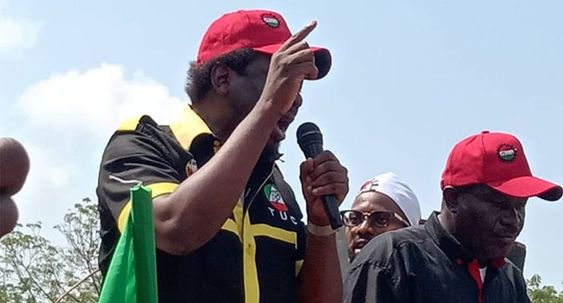Nigeria
TUC Urges Federal Government to Restore Petrol Prices to June 2023 Levels”

The Trade Union Congress (TUC) has called on the Federal Government to revert petrol prices to their June 2023 rates, citing growing economic pressure on Nigerian citizens.
The Trade Union Congress (TUC) has called for petrol prices to be rolled back to their levels from June 2023.
“We want the product price to drop lower than its previous level, not just return to what it was before but decrease further,” stated TUC President Festus Osifo during a press briefing in Abuja on Thursday.
He urged the government to intervene specifically in the sector by providing foreign exchange to Dangote Refinery at a rate of $1/N1,000 instead of the current over 1/N1,600. This action aims to significantly reduce petrol prices.
Osifo mentioned that their proposed solution, if implemented, would return prices to what they were in June of the previous year. He emphasized that every government worldwide intervenes in crucial sectors and argued that the Federal Government should not allow the oil sector to be subject solely to fluctuations in the naira’s value.
Starting in May 2023, the Nigerian National Petroleum Company Limited (NNPCL) raised petrol prices from ₦184 per litre to ₦998 in Lagos. By June 2023, the cost of a litre of petrol had reached approximately ₦450 in Lagos.
On Thursday, the TUC leader emphasized the importance of making petrol available, affordable, and accessible for all Nigerians. He stated that this commodity is essential for every Nigerian household, including those without a second-hand vehicle.
The trade union articulated its demands focused on affordability, availability, and accessibility. They stated, “We urge the Federal Government to authorize all marketers to obtain licenses from the Nigerian Midstream and Downstream Petroleum Regulatory Authority (NMDPRA) for lifting petrol from the Dangote Refinery.”
Osifo suggested that the NNPCL should look into obtaining refined petrol from alternative sources if the Dangote Refinery is unable to satisfy Nigeria’s current daily requirements.
“If it’s unavailable, it poses a problem. For instance, if the Dangote Refinery produces less than 15 million liters per day, that would be insufficient.”
READ ALSO: NLC, TUC React to FG N70,000 Minimum Wage Payment
“Efforts are underway to increase production at the Dangote Refinery, but in the meantime, it’s crucial that we explore additional methods. Until Dangote reaches full capacity and can adequately supply every part of Nigeria, sourcing alternatives is essential. This approach is vital as it will address availability concerns,” stated the TUC boss.
On Wednesday morning, Nigerians were met with a surprise as NNPC retail outlets in Lagos and the Federal Capital Territory (FCT), Abuja adjusted their petrol pump prices.
In Lagos, our correspondent noted that numerous NNPCL outlets were selling a liter of the essential commodity for ₦998, which is approximately ₦150 more than the previous price of ₦855. This abrupt hike has triggered panic buying among motorists and transporters, resulting in long queues resembling snakes at filling stations.
Numerous filling stations not owned by the NNPCL quickly followed suit, gradually raising their pump prices. In several areas of Lagos, many were selling fuel for as much as ₦1050.
In Abuja, the scenario mirrored this trend, with NNPCL retail outlets raising the price of the essential commodity from ₦897 to ₦1,030.
The recent hike came after the NNPCL raised prices on September 2, 2024. The retail company increased the cost of petrol from ₦568 to ₦855 per litre, causing widespread outrage.
Although the NNPCL has not issued an official statement regarding the recent hike in petrol prices, it suggested a potential increase when it started loading its initial batch of petrol from the Dangote Refinery in mid-September.
